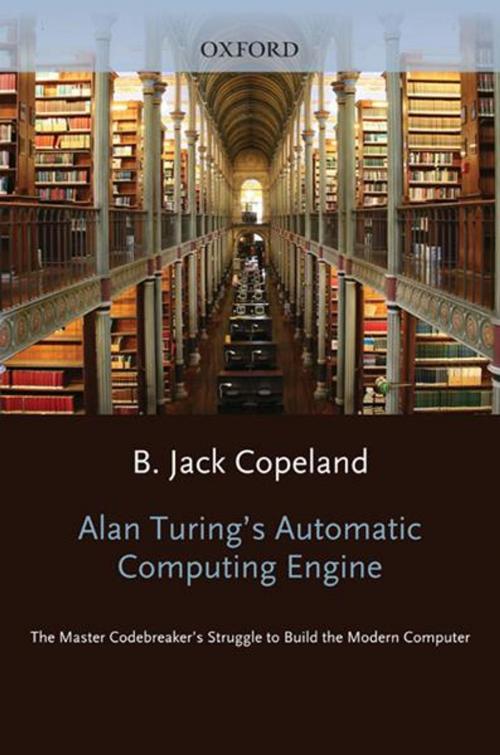Alan Turing's Electronic Brain
The Struggle to Build the ACE, the World's Fastest Computer
Nonfiction, Science & Nature, Mathematics, History, Computers, General Computing, Science| Author: | others | ISBN: | 9780191625862 |
| Publisher: | OUP Oxford | Publication: | May 24, 2012 |
| Imprint: | OUP Oxford | Language: | English |
| Author: | others |
| ISBN: | 9780191625862 |
| Publisher: | OUP Oxford |
| Publication: | May 24, 2012 |
| Imprint: | OUP Oxford |
| Language: | English |
The mathematical genius Alan Turing, now well known for his crucial wartime role in breaking the ENIGMA code, was the first to conceive of the fundamental principle of the modern computer-the idea of controlling a computing machine's operations by means of a program of coded instructions, stored in the machine's 'memory'. In 1945 Turing drew up his revolutionary design for an electronic computing machine-his Automatic Computing Engine ('ACE'). A pilot model of the ACE ran its first program in 1950 and the production version, the 'DEUCE', went on to become a cornerstone of the fledgling British computer industry. The first 'personal' computer was based on Turing's ACE. Alan Turing's Automatic Computing Engine describes Turing's struggle to build the modern computer. The first detailed history of Turing's contributions to computer science, this text is essential reading for anyone interested in the history of the computer and the history of mathematics. It contains first hand accounts by Turing and by the pioneers of computing who worked with him. As well as relating the story of the invention of the computer, the book clearly describes the hardware and software of the ACE-including the very first computer programs. The book is intended to be accessible to everyone with an interest in computing, and contains numerous diagrams and illustrations as well as original photographs. The book contains chapters describing Turing's path-breaking research in the fields of Artificial Intelligence (AI) and Artificial Life (A-Life). The book has an extensive system of hyperlinks to The Turing Archive for the History of Computing, an on-line library of digital facsimiles of typewritten documents by Turing and the other scientists who pioneered the electronic computer.
The mathematical genius Alan Turing, now well known for his crucial wartime role in breaking the ENIGMA code, was the first to conceive of the fundamental principle of the modern computer-the idea of controlling a computing machine's operations by means of a program of coded instructions, stored in the machine's 'memory'. In 1945 Turing drew up his revolutionary design for an electronic computing machine-his Automatic Computing Engine ('ACE'). A pilot model of the ACE ran its first program in 1950 and the production version, the 'DEUCE', went on to become a cornerstone of the fledgling British computer industry. The first 'personal' computer was based on Turing's ACE. Alan Turing's Automatic Computing Engine describes Turing's struggle to build the modern computer. The first detailed history of Turing's contributions to computer science, this text is essential reading for anyone interested in the history of the computer and the history of mathematics. It contains first hand accounts by Turing and by the pioneers of computing who worked with him. As well as relating the story of the invention of the computer, the book clearly describes the hardware and software of the ACE-including the very first computer programs. The book is intended to be accessible to everyone with an interest in computing, and contains numerous diagrams and illustrations as well as original photographs. The book contains chapters describing Turing's path-breaking research in the fields of Artificial Intelligence (AI) and Artificial Life (A-Life). The book has an extensive system of hyperlinks to The Turing Archive for the History of Computing, an on-line library of digital facsimiles of typewritten documents by Turing and the other scientists who pioneered the electronic computer.















